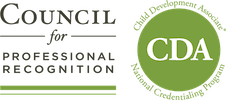Ababy’s brain begins to develop neurons before birth.i This scientific fact makes it possible for a child to start relating directly with the world since such an early age, including the ability to learn from daily interactions with you, the early childhood educator. This blog serves as an introduction to the importance of cognitive learning. It also shows how all educators can contribute to infant and toddler brain development by helping them achieve certain milestones with applied early education expertise and practices.
The youngest children in an early education setting are infants and toddlers, whose cognitive development is like a learning sponge from ages zero to three years. Think about this, and how you as a current or future CDA holder for the infant and toddler setting can contribute to the development of so many young lives beginning their earliest stages of learning. The ways in which you help children learn and develop cognitive milestones has the potential to impact young lives by contributing to their brain development; a crucial human component that can shape their lives for years to come. For instance, science proves that from as early as the first two days of life, newborns have an approximate sense of numbers – a cognitive ability.ii
You can learn more about the necessary skills to help children develop cognitively through educational training and professional development in order to provide a wholesome learning experience for infants and toddlers. Cognition is covered in the CDA’s Functional Area 5, which requires all CDA candidates are able to use a variety of developmentally appropriate learning experiences and teaching strategies to promote curiosity, reasoning, and problem-solving and to lay the foundation for all later learning.
All educators have the power to mold and help develop the brain in a healthy and positive manner when working with young children. According to the Center on the Developing Child at Harvard University, experiences influence other developmental aspectsiv:
“The basic architecture of the brain is constructed through an ongoing process that begins before birth and continues into adulthood. Early experiences affect the quality of that architecture by establishing either a sturdy or a fragile foundation for all of the learning, health and behavior that follow.”
The degree of cognitive learning in the early childhood years is dramatic, and these skills fall into nine categoriesiii:
- Skills of inquiry
- Knowledge of the physical world
- Knowledge of the social world
- Classification
- Seriation
- Numbers
- Symbols
- Spatial relationships
- Time
Knowing and practicing cognitive learning when working with infants and toddlers can help them achieve certain cognitive milestones that promote their development. But remember, each child develops at his or her own paceiii. Here are three cognitive learning phases infants and toddlers experience:
Young infants (birth to 8 months): Beginning to explore
- Imitate facial expressions and gestures of others, like smiling
- Explore using motor skills, such as turning head, sucking, kicking, grasping
- Repeat actions to make things happen or to get adults to repeat an action
- Use gestures like waving to communicate
Mobile infants (9 – 17 months): Paying attention and imitating
- Imitate everyday actions of others
- Point to objects and pictures
- Understand object permanence
- Actively sort objects into one category
Toddlers (18-36 months): Actively engaging
- Can point out and name familiar objects in books
- Sequence objects from smallest to largest
- Know own name and age and will show age by raising fingers
- Use problem solving and experimentation to determine solutions to everyday problems
The daily interactions early educators have with the children underscore the power and impact of high-quality early education, according to findings from Harvard’s Center on the Developing Childv:
“Research on the developing brain shows us that early childhood experiences build the foundation for a skilled workforce, a responsible community, and a thriving economy…To ensure that children develop these capacities; it’s helpful to understand how the quality of the interactions and experiences that our communities provide for them either strengthens or undermines these emerging skills.”
As research continues to support the need for coursework and training that supports the CDA’s Cognitive Competency Area, early childhood educators have a responsibility to young children, families and communities to be well-trained. As an educator, the ability to interact with infants and toddlers will help develop their cognitive skills and ultimately enhance their brain development as they reach milestones by helping them witness and react to daily curiosities in their environment (e.g. how plants grow, why blocks fall), how cause and effect happens (e.g. positive vs. negative behavior), experiencing what they learn (e.g. coloring within the lines, sharing with others), and even expressing emotions or thoughts.
i The University of Georgia (2017). Building Baby’s Brain: The Basics. Retrieved from http://extension.uga.edu/publications/detail.html?number=C1053-01.
ii Pappas, S. (October 21, 2013). Math Ability Starts in Infancy, Study Suggests. LiveScience. https://www.livescience.com/40576-infant-math-ability.html.
iii Washington, V. (2017). Essentials for Working with Young Children (2nd ed.). Washington, DC: The Council for Professional Recognition.
iv Center on the Developing Child (2007). The Science of Early Childhood Development (InBrief). Retrieved from www.developingchild.harvard.edu.
iv Center on the Developing Child (2012). Executive Function (InBrief). Retrieved from www.developingchild.harvard.edu.
